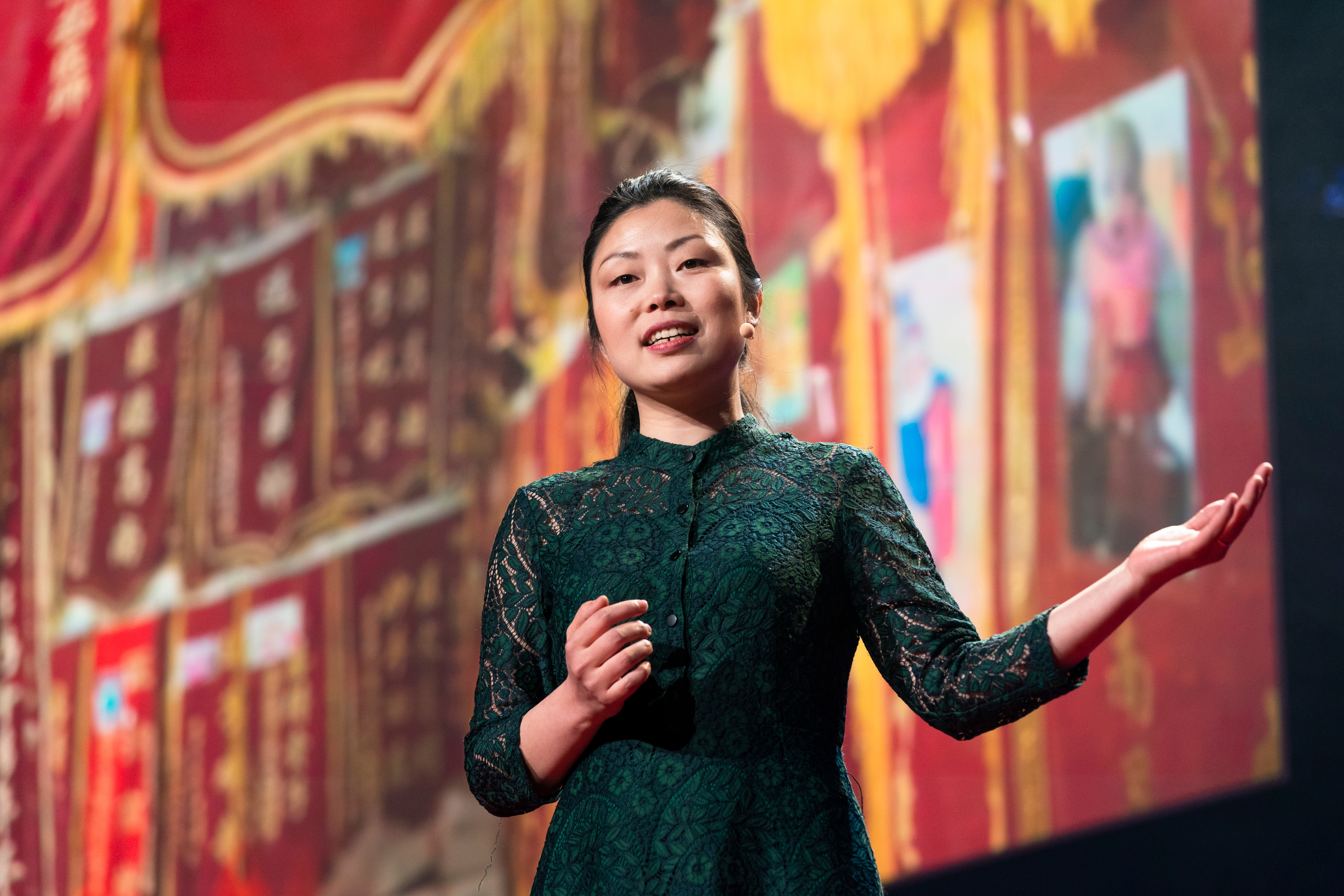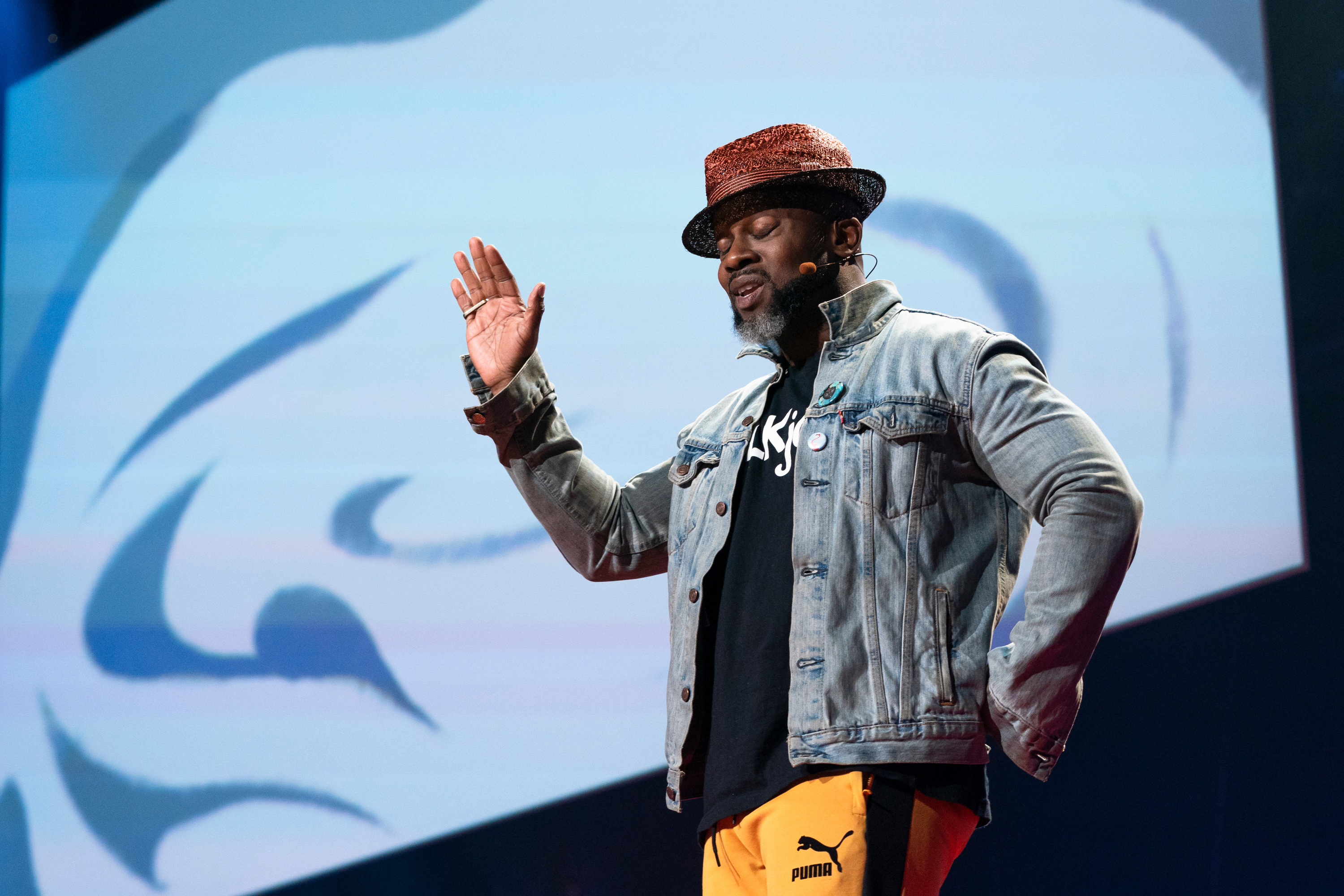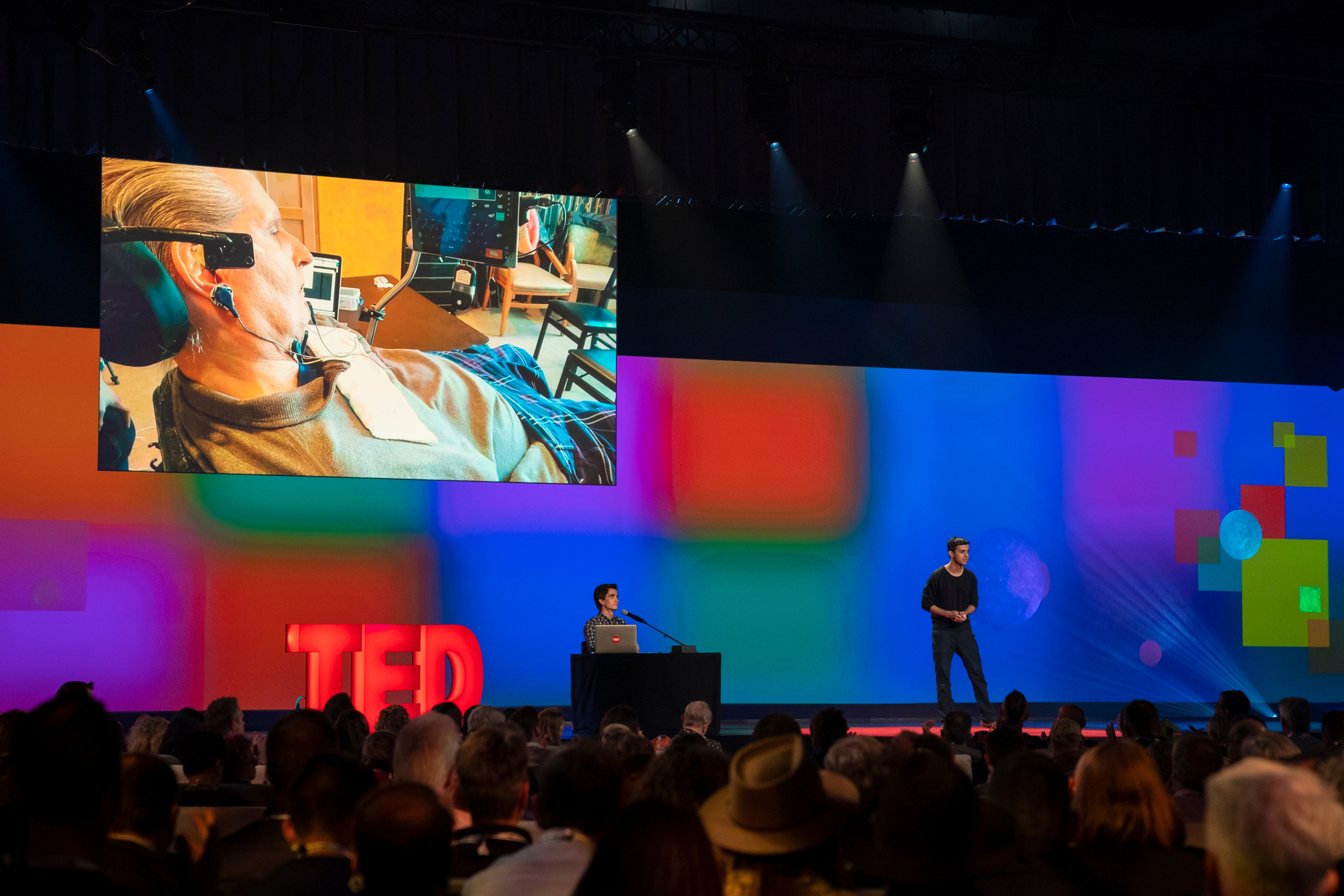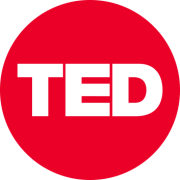https://blog.ted.com/one-with-each-other-notes-from-session-1-of-ted2019-fellows-talks/
- |
The event: Talks and performances from TED Fellows, celebrating the 10th anniversary of this life-changing, world-changing program. Session 1 is hosted by TED Fellows director Shoham Arad and TED Senior Fellow Jedidah Isler.
When and where: Monday, April 15, 2019, 10:30am, at the Vancouver Convention Centre in Vancouver, BC.
Opening: We begin the day by sharing a powerful moment with Dr. Robert Joseph, a Hereditary Chief of the Gwawaenuk First Nation, and Kristen Rivers of the Squamish Nation, who welcome us to Vancouver with a simple message: Let us be one with each other.
The talks, in brief:
Ashwin Naidu, conservationist and founder of the Fishing Cat Conservancy
- Big idea: Mangroves are crucial to the health of the planet, but they’re endangered by unsustainable aquaculture. What to do? Empower the locals in South and Southeast Asia to conserve mangrove ecosystems by celebrating the charismatic fishing cat.
- How? Naidu’s Fishing Cat Conservancy helps locals find sustainable livelihoods and move away from destructive agriculture practices, giving them strong incentives to protect and restore mangrove swamps — so that the swamps can keep gobbling up CO2 from the atmosphere, offering storm surge protection and serving as a habitat for fish and wildlife. The fishing cat, aka the “tiger of the mangroves,” helps put a charismatic face on this complicated effort.
- Quote of the talk: “Deforestation, extinction and climate change are global problems that we can solve by giving value to our species and ecosystems, and by working together with the local people who live next to them.”
Jess Kutch, founder of the digital labor organizing platform Coworker.org
- Big idea: Got an idea to make your workplace better? Coworker.org helps employees organize and engage in “productive conflict” with management.
- How? A surprising amount of the time, employees who ask most loudly for workplace improvements are those who love their jobs the most. Using Coworker.org, staffers can plan campaigns to raise wages and advocate for themselves and their colleagues.
- Quote of the talk: “We all need to be challenging and changing the parts of our work lives that are broken.“
Brandon Clifford, ancient technology architect and founder of the design studio and research lab Matter Design
- Big idea: Ancient civilizations’ ability to move massive objects (like Stonehenge’s standing stones or Easter Island’s Mo’ai heads) seems impossible to the point of magic. But we can learn those mechanisms — and apply them to contemporary design and construction.
- How? In public performances, Clifford demonstrates ancient techniques for moving massive objects – like his 16-foot-tall McKnelly Megalith sculpture that “walks” with ropes and the 4,000-pound Janus, which can be manipulated by a single person to spring to life and bob and spin in a dance.
- Quote of the talk: “In an era where we design buildings to last 30, maybe 60 years, I’d love to learn how to create something that can entertain for an eternity.”

Documentary filmmaker Nanfu Wang uncovers untold stories behind China’s one-child policy, and the creeping effects of propaganda. She speaks at Fellows Session 1 at TED2019: Bigger Than Us, April 15, 2019, Vancouver, BC, Canada. (Photo: Ryan Lash / TED)
Nanfu Wang, documentary filmmaker who tells stories about human rights in China
- Big idea: The human stories behind China’s one-child policy shine a light on the program’s devastating psychological and social effects — and on the power of propaganda.
- How? Wang grew up during the era of the one-child policy; she was ashamed of having a younger brother. Now a documentary filmmaker, she made One Child Nation to investigate the policy’s effects on people in her community, including her village’s midwife, who believes she performed tens of thousands of abortions and sterilizations. In 2019, the film won the Grand Jury Prize at Sundance.
- Quote of the talk: “With each person I filmed, I saw how deeply the hearts and minds of people can be influenced by propaganda and how their willingness to make sacrifices for the greater good can be twisted into something very dark and tragic.”
Taghi Amirani, documentary filmmaker
- Big idea: The true story of Operation Ajax, the 1953 coup staged by the CIA and MI6 to overthrow Iran’s prime minister, Mohammad Mossadegh, has been shrouded in mystery. Until now.
- How? It’s been 10 years in the making, and literally last week, Taghi Amirani completed Coup 53 with the help of renowned film editor Walter Murch (Apocalypse Now, American Graffiti). Together they sifted through 532 hours of footage, video tapes, archival material — and CIA documents — that changed the fate of Iran.
- Quote of the talk: “There’s nothing new in the world except the history you do not know” — Harry Truman
Gangadhar Patil, journalism entrepreneur and founder of 101Reporters
- Big idea: In India, rural reporters are on the front lines of important stories, but their work often goes unnoticed by national news outlets. Connecting local reporters to national publishers can get their stories heard.
- How? Patil’s platform, 101Reporters, trains local reporters and connects them with national outlets. They get paired with experienced editors on each story, helping them build skills, gain credibility — and command higher fees. This empowers rural reporters to pursue tough stories on topics like corruption and poverty. The goal? To get one reporter from each of India’s 5,000 subdistricts into the network.
- Quote of the talk: “In a country like India, transparency is key to ensure justice to everyone — especially the poor, who are often ignored.”
Federica Bianco, urban astrophysicist and professional boxer
- Big idea: Astrophysicists have amazing data analysis skills — why not ask them to analyze other datasets closer to home?
- How? Bianco and her colleagues at the Urban Observatory use astrophysical data analysis methods to study earthbound problems, like measuring urban energy use, air pollution levels, even figuring out what causes prosecutorial delays. And there’s a twist: Bianco flips the mathematical models used to detect urban pollution, for instance, to examine the reflections of star explosions on interstellar dust.
- Quote of the talk: “To study a system as complex as the entire universe, astrophysicists are experts at extracting simple models and solutions from large and complex data sets. So what else can I do with this expertise?”

In a spoken-word piece, writer Marc Bamuthi Joseph investigates the pride and terror of seeing his son enter adulthood. He speaks at Fellows Session 1 at TED2019: Bigger Than Us, April 15, 2019, Vancouver, BC, Canada. (Photo: Ryan Lash / TED)
Marc Bamuthi Joseph, writer and performer
- Big idea: What’s it like to send a child out into the world, knowing they might not come home?
- How? Bamuthi Joseph performs a jazz-inflected spoken-word piece, a black father’s tender and wrenching internal reflection on the pride and terror of seeing his son enter adulthood as he gets his driver’s license at the DMV.
- Quote of the talk: “Sixteen is younger than Trayvon and older than Emmett Till.”
Ivonne Roman, police captain and cofounder of the Women’s Leadership Academy
- Big idea: The benefits of having women in the police force are well documented. But there’s a wide gender disparity in the US: only 13 percent of police officers are female. One simple test could make a difference.
- How? At their local police academies, women fail the standard physical fitness test at rates between 65 and 80 percent, ending their careers before they begin. Roman’s Women’s Leadership Academy trains women to prepare for the current physical fitness exams — while simultaneously advocating for fitness tests that take gender differences into account.
- Quote of the talk: “We know that policewomen are less likely to use force or to be accused of excessive force. We know that policewomen are less likely to be named in a lawsuit or a citizen complaint. We know that the mere presence of a policewoman reduces the use of force among other officers … yet they’re more successful in diffusing violent or aggressive behavior overall.”
We take an interstitial break to watch a trailer from the new film from Blitz the Ambassador, a TED Senior Fellow: The Burial of Kojo. The visually astonishing film was just released on Netflix after being acquired by Ava DuVernay’s company, Array Releasing. Preview it above.

Technologist Arnav Kapur is working on a device that picks up neural signals and converts them to speech — a breakthrough tech that could give a voice back to some people who have lost their ability to speak. He speaks at Fellows Session 1 at TED2019: Bigger Than Us, April 15, 2019, Vancouver, BC, Canada. (Photo: Ryan Lash / TED)
Arnav Kapur, technologist and inventor of the AI device AlterEgo
- Big idea: What if we could integrate AI into the human body to give voice back to people who have lost their ability to speak?
- How? At MIT Media Lab, Kapur is inventing a wearable AI device with the potential to translate human thought into speech. The device, which looks a bit like a telephone headset, picks up the neural signals formed when a person thinks words to themselves — without actually speaking aloud or opening their mouths. The device could one day help people who have lost their voices (due to ALS, strokes or spinal cord injuries, say) to converse with machines.
- Quote of the Talk: “What if we reimagine computing, the internet and AI as an internal ‘second self’ of the human condition — as a direct extension of our cognition — freeing us to interact with the world around us instead of unplugging us from our environment?”
Bruce Friedrich, food innovator and founder of the Good Food Institute
- Big idea: People love meat, and they likely aren’t about to stop eating it. But how can we make meat production sustainable? Bypass the cow, and turn plants and cells directly into meat.
- How? The Good Food Institute takes an all-hands-on-deck approach to encouraging governments and corporations – including traditional meat companies – to support a new “clean meat” production industry. There are two solutions in development, both expensive and in early stages: plant-based meat products, like the Impossible Burger, and meat grown directly from cells. Given the serious threats to public health of climate change and antibiotic resistance, now is the time to change the way we produce meat.
- Quote of the talk: “It’s past time to create the next global agricultural revolution.”
Laurel Braitman, writer-in-residence at the Stanford University School of Medicine
- Big idea: Folks in the medical field spend years on clinical training, almost at the expense of all else — including their own mental health. Telling and sharing personal stories through writing can be a first step in alleviating the complex pressures they’re under.
- How: Studies show medical students have high levels of depression and some of the highest suicide rates in the United States. So Braitman encourages medical students and physicians to dig deep to find, write and share their own true and vulnerable personal stories. The result: healthcare professionals can connect more meaningfully with themselves, patients and colleagues — and catalyze empathy for improved mental health.
- Quote of the talk: “Communicating with each other with vulnerability and listening with compassion is, I believe, absolutely the best medicine that we have.”
Amma Ghartey-Tagoe Kootin, scholar and artist who develops theatrical works based on historical documents
- Big idea: America’s ideas of racial superiority and inferiority were deliberately scripted, rehearsed and performed at the 1901 World’s Fair in Buffalo, New York.
- How? Ghartey-Tagoe Kootin’s theatrical work-in-progress, At Buffalo, is based on hundreds of archival documents from the Pan-American Exposition, a World’s Fair held in Buffalo. The musical brings to life the fair’s performances and debates, which produced three conflicting narratives of what it meant to be black in the US at the time — including an important exhibit on contemporary Black life by pioneering sociologist W.E.B. Dubois. Reframing the historical record as entertainment confronts audiences with the disturbing realities of American racism in 1901 – and how they still affect us today.
- Quote of the talk: “The 1901 Fair’s legacies persist in more ways than we can imagine.”
